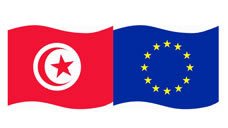The 14th session of the Tunisia-European Union (EU) Association Council held on Tuesday in Brussels was sanctioned by a Joint Declaration published on the Council of Europe website.
This session was co-chaired by Foreign Minister Khemaies Jhinaoui and EU High Representative for Foreign Affairs and Security Policy and Vice President of the European Commission Federica Mogherini. The European Commissioner for European Neighborhood Policy and Enlargement Negotiations Johannes Hahn also took part in the work of this session.
According to the Joint statement, this session provided an update on common objectives and commended the many achievements since the previous session of 11 May 2017.
“Our cooperation has notably intensified around key issues such as youth employability and reforms, democratic consolidation and the promotion of good governance, with the ongoing vital role of civil society, the response to common security challenges and the concerted management of migration, “stresses the statement.
The 2018-2020 strategic priorities agreed upon by both sides “will target inclusive and sustainable socio-economic development, democracy, good governance and human rights, rapprochement between peoples, mobility and migration as well as security and the fight against terrorism, “the statement added.
The announcement by the European Union of an additional grant amount for 2018 that will reach the maximum possible amount of 300 million Euros “illustrates the importance given by the EU to the privileged partnership”, reads the same source.
The EU commends the successful municipal elections held in Tunisia on 6 May 2018 and pledges to support Tunisia in completing the implementation of democracy in its local dimension and the process of decentralisation as a regional development vector, underlines the statement.
Both sides praised the announced support programmes for disadvantaged regions, the development of tourism with higher local economic benefits. Priority sectors such as agriculture and tourism will be complemented by support for the modernisation of the economy, with particular emphasis on innovation, the digital economy, renewable energies, research and smart specialisation, which will be subject of a specific agreement to be concluded soon, adds the statement.
In another connection, the Joint statement notes that “in view of the opportunities and challenges posed by migration, we reiterated our commitment to move forward in the visa facilitation negotiations and the readmission agreement to be concluded as soon as possible”.
The two sides also “agreed to continue cooperation in the field of security and the fight against terrorism”. To this end, they “noted with satisfaction the resumption of economic activity in the tourism sector thanks to the constant efforts of the Tunisian side to improve the security situation”.
Both sides pledge to continue the “joint efforts to support Tunisian reforms to meet international and European standards on fiscal governance and the fight against money laundering and terrorist financing”.
“The common objective,” the same source said, “is that Tunisia is rapidly meeting its commitments under the action plan agreed with the Financial Action Task Force (FATF), and is coming off the FATF list, as well as of the European Union list, as soon as possible “.
Cooperation in the valuation field and especially economic valuation of Tunisian cultural heritage and cultural diplomacy is another unprecedented action illustrating the place of culture in the Tunisia-EU partnership, with a view to the eventual establishment of a national strategy of cultural diplomacy in Tunisia, underlines the Joint statement.
Discussions on regional issues of common interest, including the situation in Libya, Syria, the Middle East and the Sahel, also took place during the session, said the source.
TunisianMonitorOnline (TAP)




